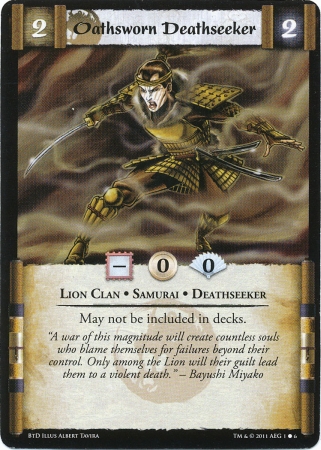Oath
(Abjuration)
Reversible: Unbind

Oath
(Abjuration)
Reversible: Unbind

|
|
|
|
|
|
|
|
|
|
|
|
|
|
|
|
|
|
Effect: By means of the oath spell,
the shukenja can attempt to force some deed
or behavior upon an unwilling
creature in return for some consideration
from the shukenja (typically sparing its life).
The creature must be able
to understand the speech of the shukenja
for the spell to have effect. The oath must be limited to actions that
can
be accomplished by the natural abilities
of the creature and cannot directly cause harm to the creature or
another. Thus, a shukenja could demand
that a highwayman swear never to rob again, that an evil monster
return to those deserted lands from which
it came, or that a lord never overtax his peasants again. He could not
demand that a monster commit suicide or
force a samurai to attack an encampment of dangerous monsters. The
DM must decide if any given oath is beyond
the restrictions given. The victim is allowed a saving throw versus
spell to avoid the effects of the spell.
However, if the victim has been subdued in combat, the saving throw is
made with a -2 penalty.
Once the spell is in effect, both sides
have free will to abide by the conditions of the oath. If the
shukenja (or any accompanying him) break
oath, the forsworn creature is instantly freed of it. (Whomever broke
the oath suffers a loss of honor, too.)
However, if the victim attempts to break the conditions of the oath, he
is
struck by wracking pains, causing the
loss of one hit point per round until he relents or dies. Oaths can be
removed by the reverse of this spell,
unbind,
or by use of an atonement.
MC: The material component for both oath
and unbind is the shukenja's holy symbol.